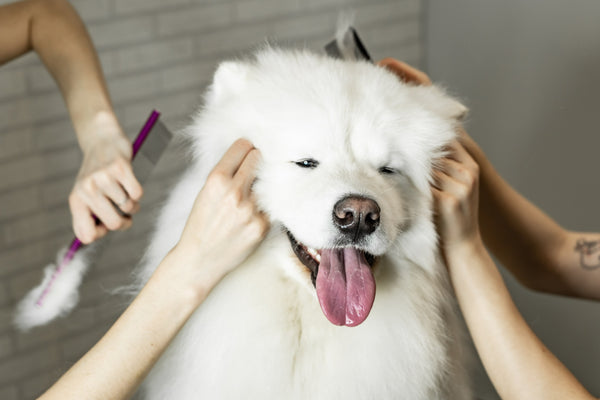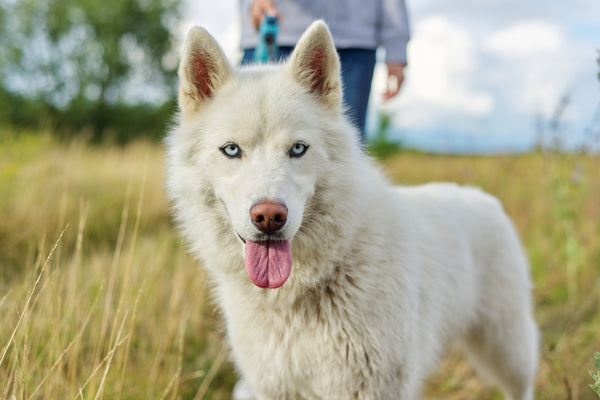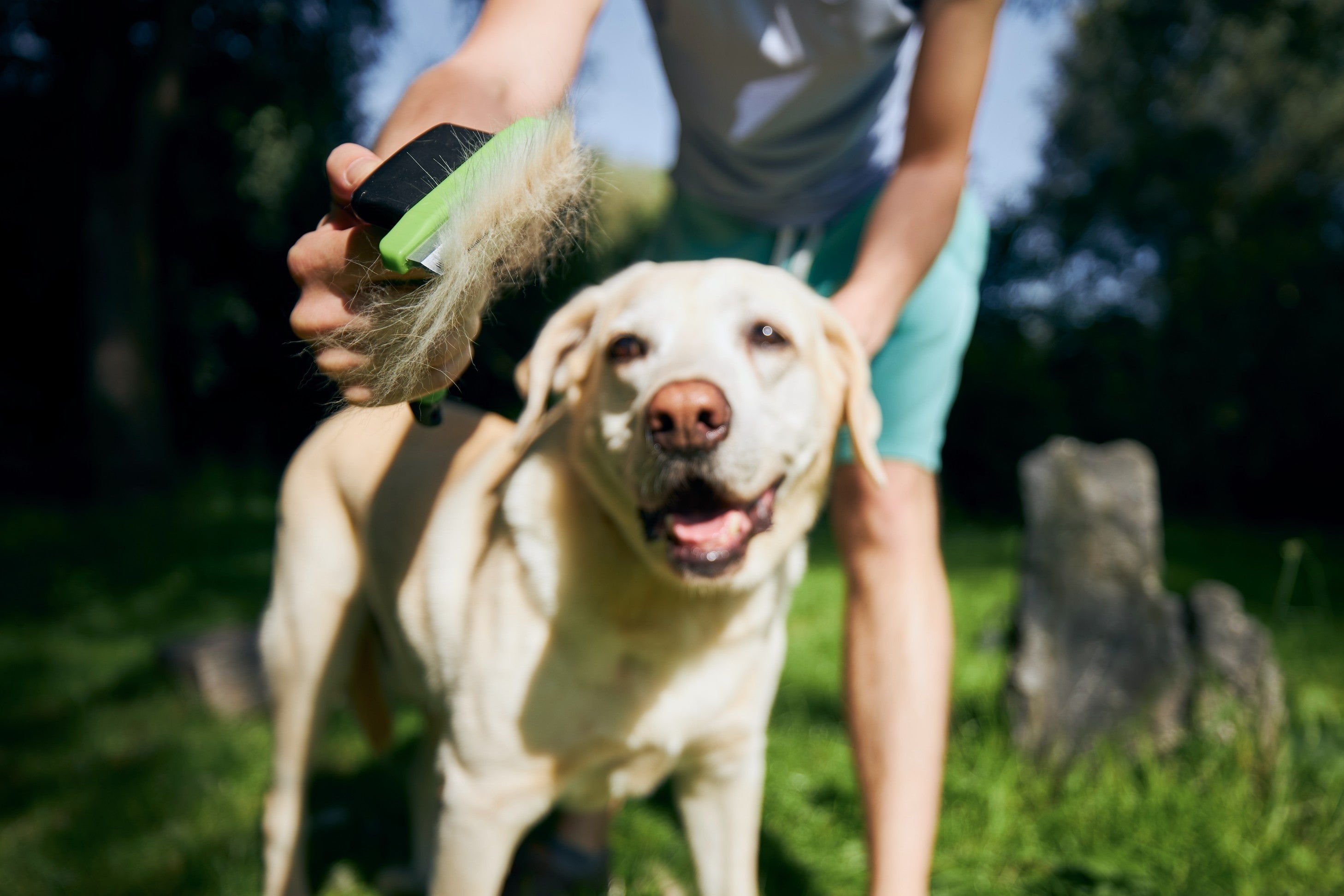For dog owners, the sight of fur scattered around the house like confetti can be disheartening. Shedding is a natural and necessary process for dogs, but excessive shedding can point to underlying health issues or other sources of discomfort.
Sifting through the various remedies available, from diet changes to grooming and topical treatments, pet owners might wonder if supplements can truly make a difference in managing their dog’s shedding. This blog post is designed to provide clarity, understanding, and practical guidance on this furry question.
Why Do Dogs Shed?
Shedding is a biological response to seasonal temperature changes. In warmer weather, your dog sheds his heavy winter coat to stay cool, and in the cooler months, he grows a thicker, insulating coat. This cycle usually happens twice a year but can occur more frequently in some breeds. Alongside the seasonal molt, dogs experience minor shedding year-round to change old or damaged hair.
Despite its natural occurrence, shedding can become extreme, leading to hair all over the home and perhaps even bald spots on your pup.

What Contributes to Shedding?
Several factors can contribute to excessive shedding in dogs:
Breed
Some dog breeds are more prone to shedding than others. Breeds such as Labrador Retrievers, German Shepherds, and Huskies have a thick double coat that requires regular maintenance.
Health Issues
Certain health conditions can cause excessive shedding in dogs, including allergies, parasites, hormonal imbalances, and skin infections. If you notice your dog’s hair thinning or you suspect an underlying health issue, consult your veterinarian for proper diagnosis and treatment.
Diet
Like humans, dogs need a well-balanced diet to maintain healthy skin and coat. A lack of essential nutrients, such as protein, fatty acids, and vitamins, can cause excessive shedding in dogs. Ensure your dog’s food provides the necessary nutrition for their breed and age.
Stress
Stress can cause excessive shedding in dogs, just like it does in humans. Changes in routine, separation anxiety, or environmental stressors can trigger excessive shedding.
Can Supplements Help With Shedding?
The simple answer is yes. Supplements can help with shedding, but they are not a magical solution to the problem. Supplements for dog shedding typically contain vitamins, minerals, fatty acids, and other nutrients that support healthy skin and coat.
Essential fatty acids, such as Omega-3 and Omega-6, are often the stars of these supplements, as they play a crucial role in skin health. Dogs that don’t receive enough of these nutrients in their diet could have dry, flaky, and itchy skin, which can further exacerbate shedding.
Certain vitamins, such as biotin (a B vitamin), are also known for their ability to support coat health. Biotin deficiencies have been linked to hair loss in dogs. Supplements may also contain zinc, which is important for a shiny and healthy coat, as well as multivitamins that aid overall health, potentially leading to a reduction in shedding.
Choosing the Right Supplement
There's no one-size-fits-all supplement that addresses shedding for every dog. Pet owners need to do their research and consider several factors when choosing a supplement.

Breed Specific
Some breeds shed more than others. Breeds with a double coat, such as Huskies or Golden Retrievers, have different coat needs compared to those with a single coat, like Poodles. Choose a supplement with specific formulations that account for your dog’s breed and coat type.
Quality Ingredients
Look for supplements with natural ingredients and minimal fillers. Low-quality supplements may not be as effective and could even cause adverse reactions.
Read Customer Reviews
Before making a purchase, check out what other pet owners have to say. Real user testimonials can provide insight into the effectiveness of the product.
Consider Your Dog’s Age
Seniors or puppies might have different supplement needs. Check if the supplement is suitable for your dog's age group.
It's also incredibly important to consult with your veterinarian before starting your dog on any new supplement regimen. They can recommend the best options for your dog's specific needs, ensuring that the supplements will not interact with any existing medication or health conditions your dog may have.
Types of Supplements
Dog-shedding supplements come in various forms, including pills, powders, and chews. The most suitable type for your dog will depend on their preferences and any potential health conditions.
Pills
Pills are a convenient option but may not be suitable for picky eaters. They also require more effort to administer than other options.
Powders
Powders can be easily mixed with food and are a good choice for dogs who don’t like taking pills. However, they may not work well for dogs with sensitive stomachs.
Chews
Chewable supplements are often flavored and can be an easy way to get your dog to take their supplement. They're also convenient as an on-the-go option.
Implementing Other Strategies
Supplements alone may not solve your dog’s shedding issue. Dietary changes, grooming habits, and even stress management can all contribute to reducing excessive shedding.

Diet
Ensuring your dog receives a balanced diet with high-quality proteins and necessary vitamins and minerals is crucial for healthy skin and coat. Consult with your veterinarian for personalized dietary recommendations.
Grooming
Regular grooming helps remove loose hair and prevents tangles, mats, and excessive shedding. Consider using a de-shedding tool designed specifically for your dog’s coat type.
Stress Management
Dogs can also experience stress, which can contribute to excessive shedding. Creating a calm and comfortable environment for your dog, providing enough exercise and mental stimulation, and seeking professional help if needed can all aid in reducing stress and shedding.
FAQs
Q: Can supplements completely stop my dog from shedding?
A: No, shedding is a natural process for dogs, and some breeds shed more than others. Supplements can help reduce excessive shedding and promote a healthier coat.
Q: How long does it take to see results from using supplements?
A: Results may vary depending on the individual dog and the supplement used. Some pet owners report seeing improvements in their dog’s coat within a few weeks. It’s essential to use them consistently for the best results.
Q: Can I give my dog multiple supplements at once?
A: It's always best to consult with your veterinarian before giving your dog multiple supplements, as they can advise on the best combination for your dog's specific needs and ensure they do not interact negatively.
Q: Can I use human supplements for my dog's shedding?
A: We don’t recommend giving your dog human supplements, as they may contain ingredients that could be harmful to dogs. Always choose supplements specifically designed for canine health.
Q: Do supplements work for all types of shedding?
A: Supplements may be effective for reducing excessive shedding caused by nutritional deficiencies or underlying health conditions, but they may not be as effective for seasonal shedding.

Q: Can I stop using supplements once my dog's shedding improves?
A: It's important to continue using supplements as directed, even if your dog's shedding has improved. Discontinuing use may lead to a return of excessive shedding.
Q: Can I use supplements to prevent shedding before it starts?
A: While some supplements may help promote a healthy coat and reduce shedding, it's important to also consider proper grooming habits and overall wellness for your dog in preventing excessive shedding.
Q: Are there any specific ingredients I should look for in a shedding supplement?
A: Look for supplements with essential fatty acids, biotin, and other vitamins and minerals that support skin and coat health. Consult with your veterinarian for specific ingredient recommendations for your dog's needs.
Q: Can I give my puppy shedding supplements?
A: Most supplements are safe for puppies, but it's important to consult with your veterinarian before using them, as some may have age restrictions.
Q: Are there any environmental factors that can contribute to excessive shedding in dogs?
A: Yes, certain environmental factors, such as dry air or excessive heat, can contribute to shedding. It's important to keep your dog in a comfortable and well-hydrated environment to help reduce shedding.
Q: Are there any supplements specifically designed for certain coat types or breeds?
A: Yes, there are supplements formulated for different coat types and specific breeds. Consult with your veterinarian to determine the best supplement for your dog's unique needs.
Conclusion
Supplements can be a helpful tool in managing your dog’s shedding, but they are not a quick fix for all shedding woes. Combining supplements with other strategies and consulting with your veterinarian is the best approach to keeping your furry friend's coat healthy and minimizing excessive shedding.
With proper care and attention, you can help your dog look and feel their best, all while keeping your home free of loose hair. So, be sure to take the time to research, find the right supplement for your dog’s specific needs, and continue providing them with a loving and healthy lifestyle.
Remember, a little extra effort can go a long way in managing excessive shedding and keeping your furry companion happy and comfortable throughout the year!













